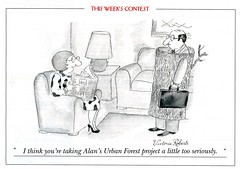Commentary: Apophenia
I am staying at the home of a friend in this small Tuscan village and with me are five other close friends. We are a myriad of nationalities in this house: Canadian, Mexican and American, and we all have different sensibilities and tastes and opinions. What we do have in common, however (other than our affection for each other), is that we all brought rather unique things with us from home in order to make our stay here more comfortable. Marian brought her favorite cereal bowl, Mark and Karen brought a fruit juice that they like, and I lugged along nine 20-ounce bottles of Diet Dr. Pepper. This (of course) caused my luggage to bulge somewhat perilously, and it was serious cause for consternation whenever I had to carry it. It was so heavy and cumbersome that I nicknamed the bag Henry, in honor of the 165-pound rottweiler that my parents own, who I became convinced the bag resembled.
I think that my bottles of Diet Dr. Pepper are both sad and comforting. Sad, because, of course, one can’t help but wonder why I can’t go without a silly soft drink for seven days, but also comforting because they are a common and consistent part of my vernacular that has accompanied me on this journey.
The things that we see around us are often attributed to how we see our place in the world, and those that create and distribute brands are convinced that the choices that we make with those brands signal who we are, and define and distinguish our affiliations. I don’t think that my choice of Diet Dr. Pepper necessarily signals any personal or brand affiliation, per se. It is more of a nascent choice really, one that I have trouble explaining. Maybe, just maybe, it is as simple as I like the way it tastes.
But maybe I am just fooling myself. William Gibson, in his novel Pattern Recognition, has one of his characters describe branding this way: “All truly viable advertising addresses the older, deeper mind, beyond language and logic. You “know” in your limbic brain. The seat of instinct. The mammalian brain. Deeper, wider, beyond logic. What we think of as ‘mind’ is only a sort of jumped-up gland, piggybacking on the reptilian brainstem and the older, mammalian mind, but it is our culture that tricks us into recognizing it as all of consciousness. The mammalian spreads continent-wide beneath it, mute and muscular, attending its ancient agenda. And (it) makes us buy things.”
I think we do buy things to help us fit in and feel more comfortable, and being part of a larger “tribe,” so to speak, is no doubt one of the benefits of global branding. Brands create intimate worlds inhabitants can understand, and where they can be somebody and feel as if they belong. I think Marty Neumeier states it best when he confides his thoughts about the tribes he belongs to in his book, “The Brand Gap:”
“We can belong to the Callaway club when we play golf, the Volkswagon tribe when we drive to work, the Williams Sonoma tribe when we cook a meal, the Nike club when we work-out.” He goes on to say, “As a weekend athlete, my two nagging doubts are that I might be congenitally lazy, and that I might have little actual ability. But I am not really worried about my shoes. But when the Nike folks say, “Just do it,” they’re peering into my soul. I begin to feel that, if they understand me that well, their shoes are probably pretty good. I am then willing to join the tribe of Nike.” But to see the world in brand tribes is to take possession of much more than just a theory of the world. It is to possess a theory of all the activity in it, perhaps an entire science, an ethology that could tell us everything we want to know about human behavior.
I think the way Neumeier describes brands is probably the most poetic and forgiving of the place that products now have in our lives. The mammalian part of our brain is indeed the part that makes us want to be part of a tribe, and I do think that we buy the brands that make us feel part of that tribe in order to be able to actually participate in that tribe. But I think it goes even deeper than that. We are buying brands and products to be part of a tribe because now, in the day and age and culture and world we are living in, we are otherwise tribeless. We feel tribeless and disconnected because, despite our technological connectedness, we are emotionally and physically further away from our friends and family than ever before. We have now replaced true closeness with people with closeness with brands that, at best, can only represent that we are close to other human beings.
On the second night my friends are I were in Tuscany we experienced a black out. As we were getting ready for bed, all of the lights in the house went out at once and the villa became an inky blue, impenetrable black. As we were in a completely foreign environment and had not memorized the paths to the bathrooms and stairs and hallways of the house, I panicked. As the adrenalin coursed through my veins, and I tripped over the concrete step in my bedroom to find the door, I had only one thought: to make sure that my friends were safe. Nothing else mattered.
After I knew that everyone was secure in their bedrooms, I sat awake in the dark thinking about them and I listened to the silence. I realized that sharing a worldwide iPod phenomena can not bring us closer to other people, it simply indicates that we all like the same thing. While participating in brand movements may indeed give us an illusion of inclusion, they will never be able to substitute for the prehistoric mammalian instinct to meaningfully connect with other humans through what I believe is our most profound need: the need to love. While we may try to substitute that need with any number of things, no brand, no ipod, no sneaker, no soft drink, and no golf club will ever be able to connect us more powerfully, more intrinsically and more viscerally than our need--and our ability--to love.























